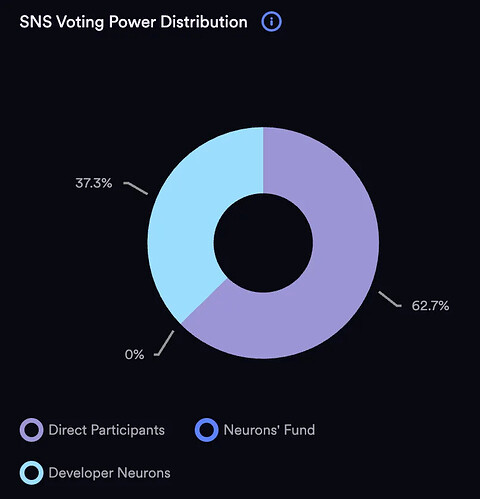Initial Review of ICPlay SNS Launch Proposal
As an applicant for the Voting Neuron Grants focusing on SNS & Neurons’ Fund topics, I am providing this initial review of the ICPlay SNS decentralization sale proposal
ICPlay is positioned as a skill-based gaming arcade on the Internet Computer, emphasizing real token rewards derived from entry fees rather than inflation, with accessibility through mobile and Telegram interfaces without requiring a wallet.
The proposal outlines SNS governance for revenue distribution, including 40% allocated to prizes and 15% to marketing, with the $PLAY token serving utility functions. The initial game, “PLAY YOUR CARDS RIGHT,” is operational and integrated with NFTs. While the concept demonstrates potential for ecosystem growth through casual gaming, several aspects warrant scrutiny, including governance centralization risks, tokenomics structure, and product maturity. The team has shown responsiveness in the thread by requesting rejection of the current proposal (137563) to address voting power concerns, which is a positive step. Below, I outline key insights, followed by specific concerns and questions for the developers.
Proposal and Thread Summary
The forum post describes ICPlay as a play-to-earn platform backed by fiat and stablecoin reserves, with milestones subject to DAO votes and legal compliance for skill-based games (no gambling license required). The thread (over 30 replies) includes community feedback on technical issues such as loading delays (attributed to 38MB data volume, with alternative links suggested), canister roles (clarified as indexer, user management, platform, and frontend), high developer voting power at genesis (44%, raising attack risks), and inconsistencies in the YAML summary (minimum participation and participants). The team has addressed these by explaining voting power for initial guidance without unilateral control, confirming verifiable features, and acknowledging YAML oversights (file is accurate). Additional suggestions include hosting an X space for transparency, and no Neurons’ Fund participation is requested (YAML confirms false). Supporting resources: Whitepaper (GitBook), GitHub (GitHub - dfinitydeck/icplay-dev), and X (@ICPLAY_APP).
YAML Analysis and Alignment with Guidelines
From the YAML file (icplay-sns/sns_init.yaml at main · dfinitydeck/icplay-sns · GitHub):
- Token Supply: 300 million $PLAY, with 70% allocated to treasury (potentially high for early DAO control), 18% to swap, and 12% to developers (vested over 6-30 months across multiple neurons/principals).
- Raise Parameters: Minimum 20,000 ICP and maximum 150,000 ICP, with per-participant minimum 5 ICP and maximum 100,000 ICP; minimum participants set at 5 (relatively low, which could limit decentralization).
- Vesting Schedule: 6 events every 3 months, providing some anti-dump measures.
- Rewards: Fixed at 1% (initial and final over 3 years, indicating low inflation).
- Dissolve Delay: Minimum 6 months, with bonuses of +10% voting power for 24-month delay and +5% for 12-month age.
- Neurons’ Fund: False, appropriately avoiding issues with the ongoing pause (Proposal 135970).
Alignment with DFINITY guidelines (e.g., thoughts on SNS swaps: DFINITY thoughts on SNS/decentralization swap proposals; voting on launches: DFINITY's voting on upcoming SNS launch proposals):
- Project and Use Case: The skill-based gaming model aligns with ecosystem development goals, offering on-chain entertainment without barriers. However, maturity appears early-stage, with reported loading issues and limited demonstrated traction.
- Tokenomics: The 70% treasury allocation and 44% developer voting power at genesis raise centralization concerns, as guidelines emphasize majority participant control post-genesis. The minimum participants of 5 is low, potentially enabling sybil risks.
- Decentralization and Security: Canisters are specified (four main plus cycles wallet), but questions in the thread about controllers (not all under NNS Root) highlight potential failure points. No audits are mentioned, contrary to best practices for security.
- Syndication and Funding: The post has been active since July, providing adequate time, but could benefit from broader multi-channel promotion. Funding uses are linked to milestones, though expenditure details remain somewhat vague.
Insights on Revenue-Backed Model and Risks
ICPlay’s revenue-backed token model ties $PLAY’s value directly to player activity and entry fees, avoiding inflationary mechanics that plague other DAOs.
This means the token’s price stability hinges on sustained engagement: Fees from games fund prizes (40% of revenue), marketing (15%), and buybacks/liquidity, creating a utility loop where more players = more demand for $PLAY (for redemptions/staking).
If activity drops, revenue tanks, potentially crashing price – opening doors to takeovers like we’ve seen in low-traction DAOs (e.g., cheap stake buys for 51% VP control).
From the thread (post 26), the team explains short min dissolve delay (6 months) keeps treasury liquid for payouts/buybacks, but config offers strong bonuses: +10% VP for 24-month delay, +5% for 12-month age – encouraging long-term holds to counter attacks. Post 28/30 highlight community worries on early dev VP (44% at genesis, risking control if price falls),
but team requests rejection of proposal 137563 to tweak for better decentralization (e.g., higher delays). Unlike pure gov tokens, $PLAY’s dual role (voting + rewards) adds incentive to hold during dips, as low price could attract players for cheap entries, boosting activity organically.
Protections vs. Other DAOs:
- Anti-Takeover: Min 6-month dissolve + bonuses make quick attacks costly (time-locked stake). Treasury buybacks stabilize price during low activity. DAO votes on revenue use (e.g., no dumps) per whitepaper.
- Low Players Risk: If no activity, price falls – yaml’s 70% treasury could be vulnerable (devs/principals hold 12% vested over 30 months, but low min participants=5 risks sybil). Team in thread says focus on product-first (skill games for retention), but no auto-burn/maturity like ICP to prop value.
- Comparisons: Other DAOs (e.g., those with inflation) crash from dumps; ICPlay avoids that, but if players ghost, it’s like a failed economy – cheap $PLAY enables whale buy-ins for VP (51% attack via accumulated stake). Mitigated by vesting (devs can’t dump fast) and DAO oversight.
Overall, solid safeguards via bonuses/liquidity, but low activity = real takeover threat if price craters. Team’s responsive (fixing VP) is positive – watch resubmit.
Concerns and Questions for Developers
While the proposal shows promise in addressing casual gaming on ICP, several areas require clarification to ensure alignment with DFINITY guidelines and mitigate risks:
- The 70% treasury allocation and initial 44% developer voting power raise concerns about early centralization. How will the revised proposal adjust dissolve delays or vesting to ensure participants hold majority voting power at genesis?
- The minimum participants set at 5 appears low, potentially increasing sybil attack risks. What measures are planned to enhance decentralization in this regard?
- Security audits are not mentioned in the proposal or thread. Can you provide details on any conducted audits or plans for them prior to resubmission?
- Product maturity: Thread feedback highlights loading issues and limited traction. What current metrics (e.g., active users, revenue generated) demonstrate product-market fit?
- Revenue Model Risks: In the event of low player engagement, how will the DAO prevent price crashes leading to potential takeovers, beyond the proposed buybacks and bonuses?
- Tokenomics: With no post-genesis minting, how will incentives be sustained long-term without introducing inflation?
I look forward to the developers’ responses to these points for greater clarity. Community input is also welcome.











